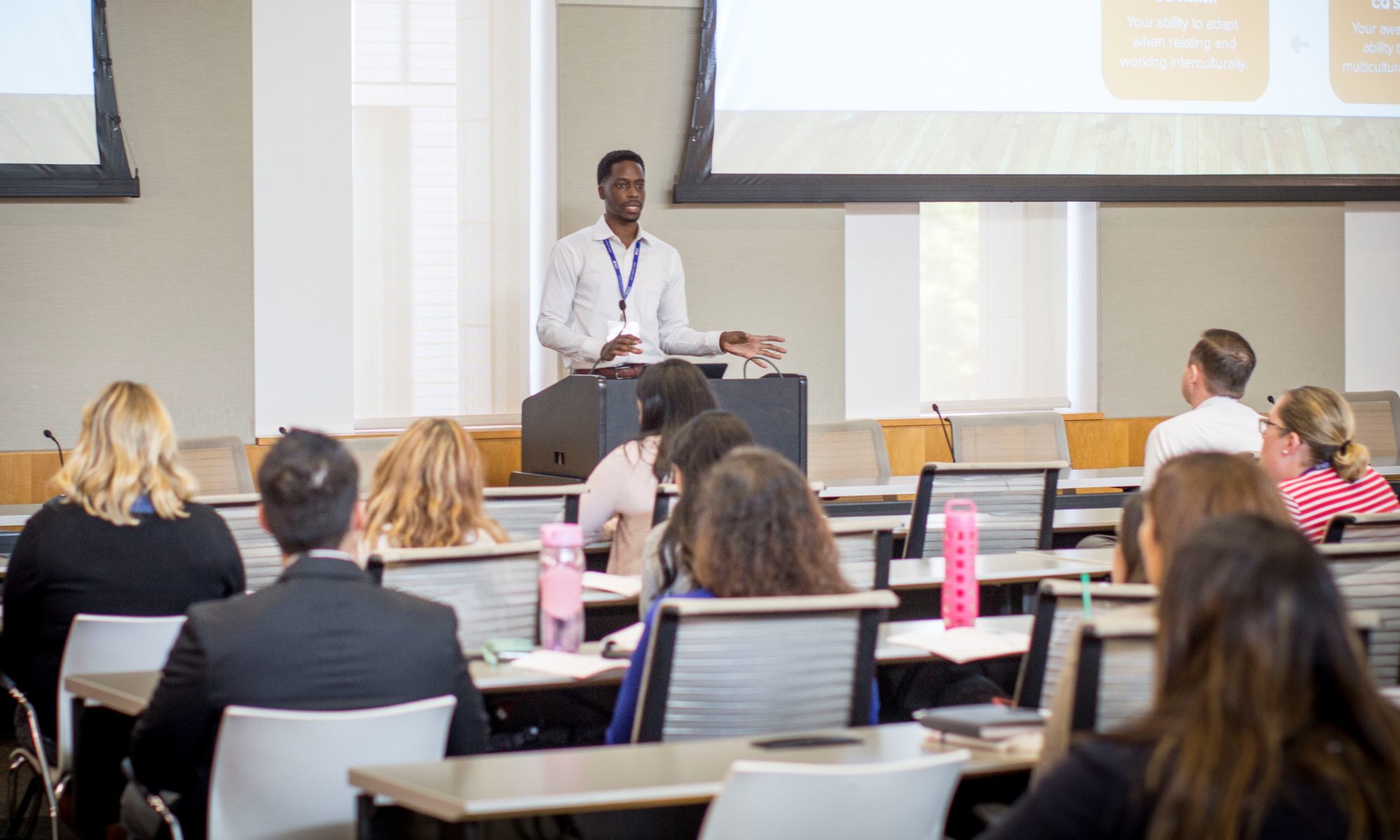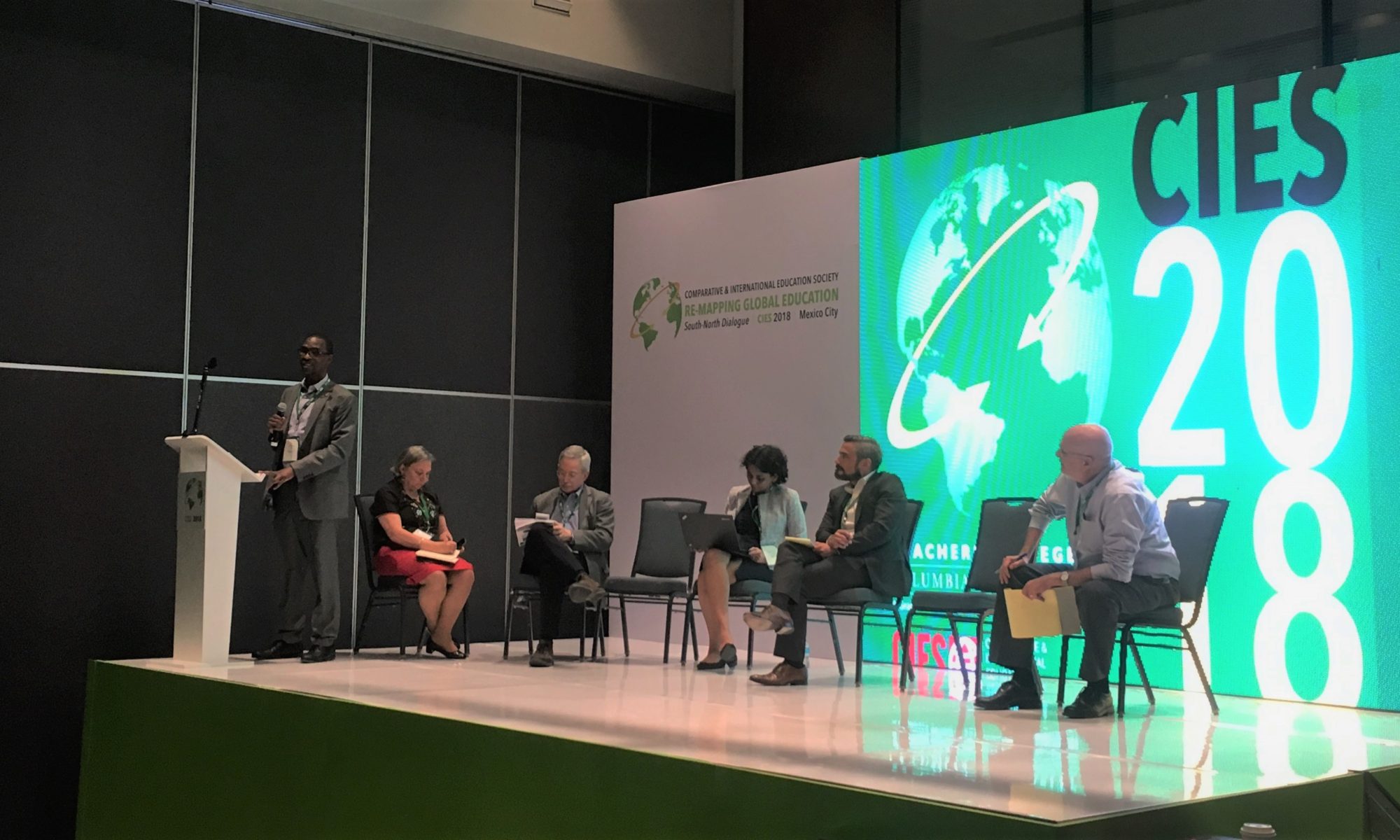Featured Image: Dr. Moses Oketch speaking during the Learning and Development panel session at the Hilton Reforma, Mexico City, March 27, 2018. (From left to right: Sylvia Schmelkes del Valle, Dr. Dan Wagner, Dr. Amita Chudgar, Dr. Rafael de Hoyos, and Dr. Luis Crouch).
For emerging scholars, attending academic conferences can be a great way to remain current on relevant work in your field, network with colleagues from around the world, and develop professionally. This past week, I attended the Comparative and International Education Society (CIES) 2018 conference in Mexico City, MX with the intention of doing all of those things and more.As a first year doctoral student trying to find my place in the field of international and comparative education, this was a space for me to closely observe the industry and develop upon how to frame my research and practice. In this blog, I will share 5 key takeaways related to making the most of a conference experience. Although this post has been inspired by the CIES conference, the information can be generally applied to any academic conference.

1. Plan well in advance. Conferences are planned years in advance for a reason; Fitting the time in to our schedules to attend is a significant challenge and sacrifice.
As soon as you confirm your participation in a particular conference, you should go ahead and begin making travel arrangements for components that can be secured. I purchased my flight and Air BnB reservation approximately four months in advance which provided a decent rate and peace of mind concerning accommodations.
In addition to logistics, you will have to consider how time at the conference will interfere with your workload. Many conferences are held in the middle of the semester and students are still expected to be on top of their class work just like professors. Therefore, it is advisable to complete as much work as possible prior to leaving so that you aren’t worrying about other assignments and responsibilities when you should be making the most of your limited conference time.
2. Develop multiple elevator speeches. We have all heard the importance of crafting an elevator speech for speaking to strangers about our work. However, considering the multi-dimensional nature of scholarship and the diverse groups of people we come across, I believe developing multiple elevator speeches is more useful.
For instance, an elevator speech which highlights your dissertation would be relevant for a potential co-author, or editor but if you were talking with grant-makers then you might want to focus on your past project management experience instead of your dissertation. Professionals who manage multiple projects on different levels do a good job of code-switching to facilitate meaningful conversations.
3. Divide and conquer. The number of sessions, meetings, receptions, workshops, round-tables, etc. can be overwhelming and overlapping. Instead of spreading yourself thin, I suggest teaming up with colleagues you trust and split up to review predetermined events.
True story: On the first day of the conference, I was in back-to-back activities from 8 am to 7:30 pm…Never again! Yes, I discovered a ton of valuable information but by the end of the day my anxiety combined with restlessness began to show on my face and I could only think about getting out of the hotel. To avoid a similar situation, it would be wise to pace yourself and schedule efficiently so that you sustain your energy for the long-haul.
4. Respect yourself. Us Nigerians have a common and simple saying; “Respect yourself”. Even though a conference typically lasts 3-5 days, your reputation lasts a lifetime and news spreads quickly within any industry, especially academia.
If you are using the conference as an opportunity for professional development (which you should be), then you will want to conduct yourself professionally at all times. I understand that we work hard year-round and deserve a break but an academic conference should not be attended with a “what happens in (blank), stays in (blank)” mentality. The issue of respectability becomes particularly pertinent when alcohol is involved. I am not saying that having a drink or two is bad but I am saying that you should respect yourself.
In my opinion, it can come off as immature or irresponsible when conference attendees show the most excitement towards drinking and partying during these few days. In addition, if one goes over his/her limit in public there can be major ramifications (which I did observe and will keep to myself for now).
5. Network strategically. Disclaimer: This takeaway is instrumental and political.
Networking can be a vague term that doesn’t come with instructions. While some network naturally, others find it more difficult. Either way, networking is an important component of career development.
The amount of time and energy it takes to discuss our grand ideas can add up and it’s important to consider what sort of return you might be getting on this investment. When time is limited, the worst thing one can do is spend 30 minutes having a conversation that does not contribute to your agenda. To ensure that you engage in meaningful exchanges during a conference, I recommend for attendees to do two things; a) predetermine “must-meet” people of interest and b) identify topics that can help build your work.
Using the former strategy, you are guaranteed quality content from an established figure in your field. For me, people of interest that I needed to meet were Drs. Moses Oketch, Fabrice Jaumont, and Jose Cossa, among others. For the people I was not able to meet in person, I took to social media and was able to gain access to presentation documents via twitter which was a benefit of technology. In addition, if you are not able to schedule time to meet with a person of interest, then the next best thing is to attend a session they are presenting in.
As an alternative to the rigid structure of predetermining specific people to network with, then you can choose topics that you want to learn more about and find people to talk with based on that. This approach allows for a more natural flow of conversation with other attendees. By just speaking with a random person while getting coffee in the morning, I was introduced to a session that I was not aware of and ended up featuring a person of interest as well as new scholars that I was not aware of. Natural encounters like this usually make for the best stories.
In summary, these are only a few of many takeaways that were produced upon reflection of my CIES 2018 experience. Feel free to comment with feedback or additional points of consideration that you think should be added.
O.O.O.

